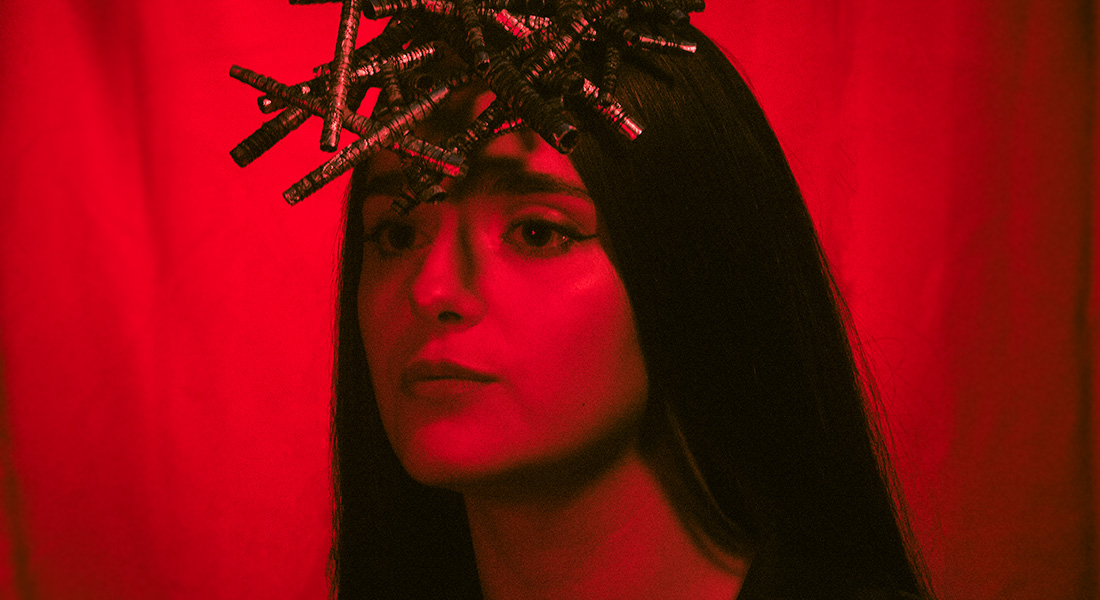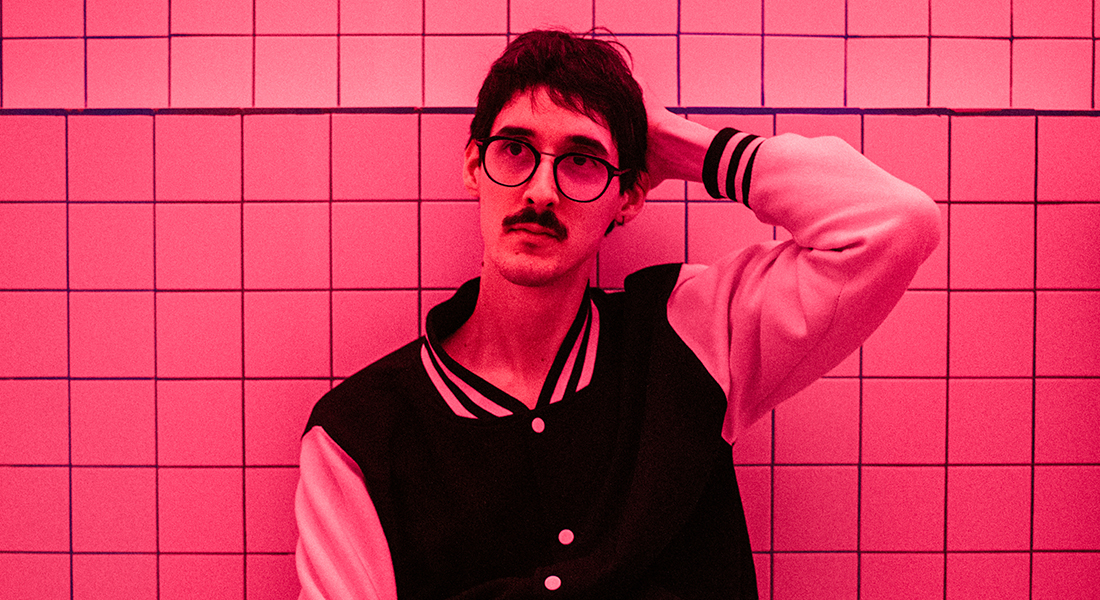Ghost of the Shelf is a mysterious label at first glance. With two cutting-edge compilations & around twenty artists that have pushed themselves beyond what they thought were their limits, the label has found the winning formula to spark the interests of its listeners. The young label has decided to take on an adventure dozens of artists that all have strong and unique music signatures, by giving them a challenge : produce a different type of music, no matter how far from theirs, while still incorporating in the new track their uniqueness. After barely a year of existence, they have already released two compilations and an artist’s EP, and it is the latest compilation to date, “From the Shelf 002”, released on February 16, which we are focusing on today.
And as the label itself intrigued us a lot, we went to ask Alexandre, its founder, a few questions in order to understand their vision and the overall project of this new label a little better.
Hello Alexandre ! Thank you for answering our questions today. Can you first introduce yourself and tell us what made you want to create the label that is Ghost Of The Shelf ?
Hello ! I’m Alexandre, I’m the curator, the label owner and the boring guy who takes care of the paperwork ! I was managing an event organization collective in Lille, North of France, called “Neyrath”, until the end of 2019. Before leaving the collective, the idea of setting up a label had already settled in my head. During the first lockdown, I told myself that I had to do something, not only did I miss what I was doing before, but I had given up on a project before the pandemic and I wanted to get back to it. And it was the first artists of the first compilation who motivated me to go back to my roots ! Then the craze around crowdfunding, the support from friends … after all of this, the label became a reality ! Also I wished to create a particular artistic framework, I wanted to cultivate differences without putting too many tags on it… I will talk about it more later on, but that is also what really motivated me.
What about the name of the label, where does it come from ?
I like making puns and references, just like any other 25-year-old who’s seen too many movies and ads (laughs) ! The name comes from “Ghost In The Shell”, the animated manga. The image of the ghost in “the ghost of the shelf” however represents the label’s project, the idea is to get the artists out of their comfort zones, to bring out certain sounds and tracks that were left in a corner, and for me the corner is the shelf.
You were already working with artists before, so I imagine that spotting the artists who are on these two compilations was quite easy for you ?
Basically, during this first lockdown, I spent a lot of time on SoundCloud and on social media. The first lockdown was insane, the effervescence that there was within all the artists’ projects had never been so intense : there were lots of videos, lots of digital live shows … And there are artists that I have spotted like that, like Baume for example [featured on the compilation From The Shelf 001], I discovered him through an interview he had given for White Label Radio, and the explanation of his project, his lifestyle, his music style and his thinking process, I really found myself in it, so I contacted him. From there, I told him about the project and it worked ! Then, as you said, I worked with artists from Lille, and some of them are friends of mine. Hune with whom I managed the Neyrath project, I told him that I was launching a label and that he had to be a part of it. At least for the first release, as a reference to our past project.
I’ve contacted other artists from my local scene as well as others that I have been following for a long time. In the first compilation there’s Scélérat ; he is a “SoundCloud producer” – I over exaggerate intentionnaly, but he goes to his room, he composes and then releases music. And I love what he does, so I contacted him, I harassed him, he hated me (laughs), and it worked ! In fact, everything happened very naturally.
And you have voluntarily worked almost exclusively with artists from your local scene ? Or have you opened up to other French or even foreign artists ?
Both, in fact, in the sense that for me, it was obvious, it was obligatory to involve Lille, I am from the North of France, this is where I come from, it seemed logical to me ! I meet artists from Lille, artists from the North of France and from Belgium all the time, so it was mandatory for me. On the other hand, I am completely open to French and international artists : in the first compilation, you have artists from Grenoble, Paris, the West of France, we also had Nathan Colinet from Chimay (Belgium), and in the second compilation there is a German artist (hi Riko). We do not want to separate the local, national and international scenes, these artists all want the same thing. They must be considered equal because they do not necessarily have the same visibility, which is something that matters to us.
And so, with these artists that you knew from near and far, what is the process of creation that you adopted with them ? Do you give them some instructions or do you let them produce however ? Or, on the contrary, did they have some pre-recorded tracks on the side that they didn’t have the opportunity to release yet ?
So for the first compilation I got both ! The idea was to give an artist the possibility to get out of their comfort zone and to compose something different, and that principle includes an idea of creation, of making something new. When you make industrial techno for a living and then you say to yourself “this time I am going to make some Romanian micro-house”, well there obviously they don’t have a track that could resemble that. But then you have some artists that compose like machines (hi SjR), they compose a lot of different stuff and then put their compositions back in a little folder on their computer ! So I had both ; S’il Te Plaît Bruno’s track, on the first compilation, is a track that he had started working on a year and a half before he released it with us. He took it out of the folder and reworked it, and he made some something new. I liked to contact the artists by telling them “I love what you do, I love your signature, but do something else”. This is the only directive I have ever given them. The only directive was “go experiment, try something new”; they had “carte blanche” for everything else. Of course, if the artist needs feedback, we’re there, but otherwise we don’t touch anything. 100% free to create whatever they wanted.
Similar to Ghost Of The Shelf : We talked with microqlima, the independent label that fights for the French music scene.
But still, was it voluntary to lead them more or less all on the spectrum of house music ? Because among the artists that are featured on your compilations, you have some that are known for making either techno or synthwave, while there, they have more or less all composed tracks that resemble house music and its variations. Was it voluntary or did it happen by accident ?
It’s actually happened by accident ! It was not done on purpose. I noticed something when I asked them if the project motivated them : I never put them all in a Messenger group (at least not at the beginning), they never interacted with each other when they were composing. They might all be part of the same music scene, or have their music be of the same genre, but overall there was no specific music, style… we did not ask for any specific genre !
They didn’t exactly focus on doing “the opposite of what they do”, actually they’d rather work on something that was important to them, more than copying what they listen to on a daily basis. And if the result sounds like house music overall, then so be it (laughs) ! When we were working on the tracklist with our sound engineer (Studio Gault), we really wanted to create something meaningful, we wanted it to tell a story.
If we take K-Nu for example, who is certainly the most prolific artist on the compilation on top of being able to compose in a lot of different music genres, he has already produced house music before. However, he had never produced a house track so melodic and soothing before releasing “Endearing Melancholia” – an aptly named track by the way ! How did the production of this title come about ?
He actually told me how he produced it ! He told me he wrote the song overnight when he went down to the South of France, by the seaside, in September. The inspiration came to him from the first evening, he told me his wanted “to compose a song that was depicting my melancholy, and I wanted to transmit a message, a real emotion.”
And it is felt ! That’s why I find the name of the track particularly suited for.
And by the way, “Endearing Melancholia” was not the original name of the track, we had another one, that we had validated and that we had put in the contract, but it was not adequate, so we changed at the very last moment. And “Endearing Melancholia” is the one that remains. I completely agree with you, its title is very representative.
Having said that, I believe that the most impressive production on this compilation is Noir Dissident’s, who put aside his usual dark and saturated techno in order to compose a much more contemplative and stellar track. Is it difficult for an artist to get out of his comfort zone like Noir Dissident did ? Have you dealt with artists who didn’t accept the challenge you are giving them ?
For Noir Dissident, making this track was almost cathartic. When the compilation was in the making and I was discussing with the artists, the desire to try to compose different sounds had always been lying around, at least for those who have done it. I’ve had people decline my offer, I’ve also had some people ignore it, and some of them even got upset ! Some of them got almost angry at me, they told me “what are you talking about, I’m always stepping out of my comfort zone !” Some did not appreciate the offer, some refused the process. I have dealt with artists who have 15 to 20 years of experience in the music industry, if not more, who completely refused and who did not like what I was offering them. And some of them explained me that they weren’t comfortable with the exercice ! It was interesting to see that as many reasons as there are profiles, it’s not that easy to get out of your comfort zone.
The project itself is so “niche” that it is understandable, in fact, to see people react negatively to my idea, my proposal. It was to be expected, I’m offering them something odd and very precise. So to finish on this subject, I think it’s important that everyone get out of their comfort zone, and that they dare to do so. So yes, it’s difficult, some people had a lot of trouble with the exercise, we had songs on which we had to do a third, a fourth, a fifth version of them. But since they had no boundaries or direction to follow whatsoever, I knew that could happen as well.
Another label did something similar at around the same time you released your first project : that of the French artist Molécule, who released the ambient compilation “Music for Containment” during the first lockdown. On this extensive compilation, we find many artists from various music backgrounds, and each of them (from Malik Djoudi to Rebeka Warrior) have been proposed to compose ambient music. Initially, I was going to ask you if in the future you were planning to leave the house spectrum and explore other music genres, but actually, you and Molécule had the same philosophy without knowing it ! Wanting to take artists elsewhere for the sole purpose of releasing something different, no matter whether it is coherent or not.
That’s it, I can’t say it better than you did. However, we do not want to be seen as elitist, because we advocate for accessibility. Our main goal is to reach a curious audience. It might sound stupid, but if we have tickled someone’s curiosity, even just one person, I consider it a win. When we take a close look at what Molécule has done, he gathered well-known artists around a very specific music genre, around a very striking theme, and the compilation is coherent form beginning to end. Now, to continue on what you were developing, we are not going to stick to house music only, whether in the compilations or in the EPs that we will be releasing. We have a few projects that are coming up that have nothing to do with house music. The idea is always to surpass yourself as an artist and to offer something else to the public, always in order to tickle people’s curiosity.
By the way, at the end of March, we are going to release an EP by Roland Cristal, it is going to be close to what Salut C’est Cool does – they know each other well. And even there, it has nothing to do with our compilations. We may lose listeners along the way, but that’s okay, since the label is very young. The vision I have in mind has not been fully developed yet. We still have projects coming up, and I don’t want to be seen as the “label that releases compilations”, I would like it to become a “label of curiosity”.
In our compilations, we will still stay in a fairly eclectic artistic direction, we will never commission an artist for what he usually does or for a specific thing on our compilations, we will never have a “Summer Reggaeton 2019 Compilation” if you see what I mean (laughs). We will continue in our current direction, we will try to attract new artists, to make the project grow, but always in an eclectic direction. That I think is what matters the most to me. We have a third compilation coming in May, and it does sound very electronic, maybe a little more avant-garde but still coherent. When we celebrate our first year of existence in July, we’ll see what we do, but we will remain eclectic, that’s for sure.
Moving on to something else : you have set up a crowdfunding campaign to support the production costs of your releases. What has it allowed beyond that ? Have you been able to reach a new audience thanks to this campaign ? Because basically it is a means of communication like any other, when you think about it!
I started this crowdfunding campaign by saying to myself: “the label is about to launch, we don’t necessarily have the funds for our project” – it didn’t scare us to invest time and money in the project though, because it is very important to us, but you as you said : it was for us a way to communicate. It made the project look real and concrete, it legitimates and validates it. We asked for 1,600 euros, we reached our goal and got 1,623 euros, from which you take out the 8% commission from KissKissBankBank, so we earned a little more than 1,500 euros. These 1,500 euros helped to fund the first two compilations and the EP of Racine. So from the campaign that started in August / September 2020, it allowed us to release stuff until February 2021. So that’s pretty crazy ! It allowed us to make the goodies we sold after the campaign, it allowed us to make money eventually… That’s also why I was talking about legitimacy. We contacted the press for press coverage, well some have told us no because the label was literally two weeks old, but some also agreed to review our releases because we had taken the time to make a crowdfunding campaign ! And because it proved them that an audience was following us.
It allowed us to put out regular, interesting and consistent newsletters, it allowed us to put out some content even before the first release ! The crowdfunding started in August, and the compilation was set to be released on September 15th. For a month and a half we had to make posts, stories ; we had to talk about our project and try to engage people around it without pushing it too much either. We made stories by showing the rewards that we would give if people donated, we made stories to show the progress of the campaign, and it started to take off from there ! Well, only a little : 52 people helped us finance the project. On a label scale, that’s not much, but it was still the first 52 people to believe in our project.
As for the new audience that we could’ve gathered through this campaign, weirdly enough no, it did not attract any new listeners. We involved a lot of people around us, people with whom I had worked before. We especially won the loyalty of people who followed me personally on the networks, even if we had some new faces all the same who took part in the campaign. . So no, we haven’t reached a new audience, but the campaign validates our project and our future. And that pushes us to go further ! It brought to life this idea that I had in my head several months before.
And finally, if the pandemic ended tomorrow, what would you and the label do ?
So, if it ends tomorrow, we’re having a big party ! We’d host a big event to thank all of those who donated and the artists who took part in the project. It might sound silly, but the crowdfunding campaign enabled the first compilation, and I even said to myself a month before the end of the campaign “hey, we’re going to have a release party !” We’re going to host a party that donors can enter for free… We had ideas, I even worked with a caterer for this evening, because it seemed important to me to create something and not to have a simple party with sound coming out of a sound system. We canceled however, because we knew the second lockdown was coming.
So yeah, have a big party, and then on the “label” side, I would like to concentrate on the development of a roster. For the moment, we do not have any, we have only signed artists on a “one shot” project, because that was what was intended at first. But if the pandemic stops and we can organize parties and events, I would like to support artists and offer them artist services. For the moment, we have music video projects, we support some fundings here and there, but if we could support artists a little bit better and further, that would be great.
This is generally what a label does next, indeed.
Exactly. So a big party, artist services, and we hope that the label gets to live another year at least !
Ghost Of The Shelf is to be found on all streaming platforms. You can also support them by buying the compilation on Bandcamp (and it is available on tape) !








